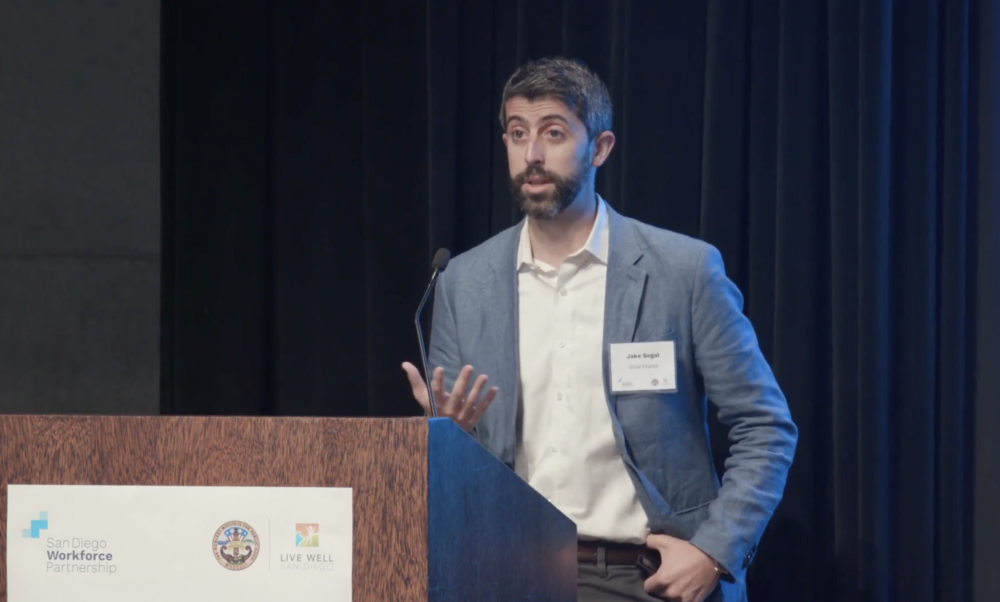
Their paths to Pay for Success and the future of impact investing
Jackie Khor and Andrew Chen joined Social Finance in January 2020 to lead essential social investment work, most notably, the continued development and expansion of the Career Impact Bond (CIB) strategy. We talked with them about how they came to Pay for Success (PFS) and what they think lies ahead for the impact investing space.
What drew you to Social Finance and PFS more broadly?
Andrew: As I get older, I think about this more and more — how being an immigrant has made a big difference to me and changed my outlook. I came to the US when I was a child but only as an adult have I realized how difficult it must have been for my parents. The financial system doesn’t work well for immigrants. For example, my parents couldn’t get mortgages because they didn’t have credit histories and it was difficult for them even to set up bank accounts. I consider myself lucky because not everyone gets the opportunities I have had. But I think we can do a better job integrating different segments of our society.
People ask me how I started in engineering and jumped to this impact investing niche. I tell them that they may be different fields but they both center on addressing systemic issues and use the same sort of mental tool sets. As an engineer, I was designing more environmentally sustainable products by accounting for market mispricings and related structural issues. In impact investing, I am also dealing with market failures and figuring out how we can redefine ROI and realign value.
Jackie: I’ve been fortunate enough to work in multiple spaces — the capital markets, the nonprofit sector, and philanthropy — that Social Finance navigates. So the organization represents a natural point of confluence for me. Using capital to drive positive social and environmental outcomes has been a through-line in my career for the past 30 years.
Social Finance has evolved to encapsulate version 3.0 of impact investing. Here, it’s not only about mobilizing capital and channeling it into specific impact investing opportunities but also working with government to inform policy. To create the systemic change Andrew was talking about, you’ve got to affect policy and influence how governments spend money by incentivizing or disincentivizing certain behaviors.
Each of you come to Social Finance with extensive impact investing experience. Jackie, you helped pioneer impact investing as a cofounder at Imprint Capital, and Andrew, you oversaw community development venture capital (CDVC) work at BlueHub. What got each of you interested in the field and how do you see it developing in the near future?
A: My CDVC work was very much an extension of the kind of investing I was interested in anyway. Way back when there was no such thing as double bottom line-investing or impact investing, I was particularly interested in work related to fields like environmental sustainability and advanced manufacturing — areas that people weren’t really thinking about at the time. I realized that once you started layering technology into certain businesses, you could get a leveraging effect with more growth yet lower risk.
In those days I wasn’t thinking about workforce development because I didn’t have that background. Later, after I got into CDVC, I found opportunities to incorporate catalytic capital and technology into investments that also positively impact our communities.
J: CDVC was one of the early sectors that had opportunities for impact investing primarily because there were subsidies like low-income tax credits that incentivized the private sector to invest in affordable housing and other community development projects. So I did work in that space on the investment side at the Rockefeller Foundation.
A: You guys invested in us!
J: Yes, when I was at Rockefeller, I invested in Andrew’s first or second fund. But recently I’ve been working in education. During the 19th and 20th centuries, education was the great equalizer and now it’s become the great divider. Research shows that educational access is one of the key determinants of individual opportunity. But today access to education is based on the zip code you were born in or where your parents went to school. That’s anathema to the American values system.


